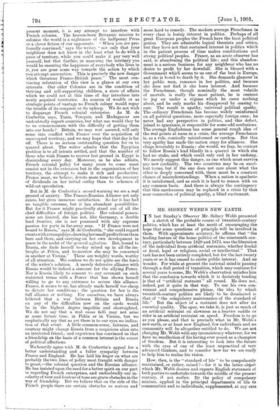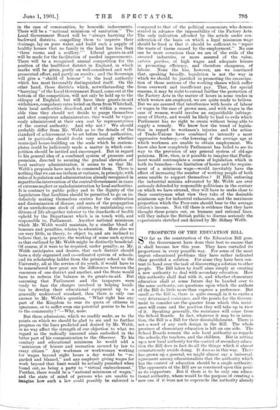MR. SIDNEY WEBB'S NEW EARTH.
IN last Sunday's Observer Mr. Sidney Webb presented a sketch of the probable course of twentieth-century politics, which has at least the merit of encouraging the hope that some questions of principle will be involved in them. With approximate accuracy, he affirms that "the leading feature of the home politics of the nineteenth cen- tury, particularly between 1820 and. 1873, was the liberation of the individual from artificial restraints, whether feudal or fiscal, legal or religious, social or intellectual." That task has not been entirely completed, but for the last twenty years or so it has ceased to excite public interest. And no wonder. For while at present the national mind is passing through a dull period of transition, which may continue for several years to come, Mr. Webb's observation satisfies him that the conclusion towards which it is decisively tending is that of "artificial restraint" all round. He does not, indeed, put it quite in that way. To use his own con- venient and comprehensive phrase, the idea, by which twentieth-century politics are likely to be dominated is that of "the compulsory maintenance of the standard of life." But the object of a restraint does not alter its essential quality. The spur, we take it, is just as much of an artificial restraint on slowness as a heavier saddle or rider is an artificial restraint on speed. Freedom is to go as you please, and that is precisely what in Mr. Webb's new earth, or at least new England, few individuals and no community will be altogether entitled to do. We are not charging Mr. Webb with any inconsistency whatever, for we have no recollection of his having ever posed as a champion of freedom. But it is interesting to look into the future with the eyes of one of the least unpractical of very advauc,ed thinkers, and to consider how far we are ready to help him to realise his vision.
How, then, is the "standard of life" to be compulsorily maintained, or rather, raised ?—for it is the latter object which Mr. Webb desires and expects English statesmen of both parties to undertake towards the middle of the present century, if not earlier. By the policy of compulsory minima, applied in the principal departments of life to communities and to individuals, supplemented, at any rate in the case of communities, by honorific inducements. There will be a "national minimum of sanitation." The Local Government Board will be "always harrying the backward districts, compelling them to improve their drainage, lay on pure water, and build such a supply of healthy houses that no family in the land has less than three rooms and a scullery.' " Liberal grants-in-aid will be made for the facilitation of needed improvements. There will be a recognised annual competition for the position of the healthiest district in England, in which marks will be given, partly on well-considered and well- prosecuted effort, and partly on results ; and the Sovereign will give a "shield of honour" to the local authority which has most favourably distinguished itself. On the other hand, those districts which, notwithstanding the " harrying " of the Local Government Board, come out at the bottom of the competition, will not only be held up to the obloquy of England, but will have their grants-in-aid withdrawn, compulsoryrates levied on them from Whitehall, their local authorities dissolved, and if within a reason- able time they should not decide to purge themselves and elect competent administrators, they would be victor- ously administered at their own cost by representatives of the central authority. And why not ? We should probably differ from Mr. Webb as to the details of the standard of achievement to be set before local authorities, and in particular should doubt very seriously whether municipal house-building on the scale which he contem- plates could be judiciously made a matter in which com- petition should be invited and encouraged. But in regard to his general idea of a combined system of pressure and premium, directed to securing the gradual elevation of local sanitary administration, it seems to us that Mr. Webb's proposals have much to commend them. There is nothing that we can see in them at variance, in principle, with rules of legislation and administration already recognised in regard to the intervention of the central Government in cases of extremeneglect or maladministration by local authorities. It is contrary to public policy and to the dignity of the Legislature that localities should be permitted to go on in- definitely making themselves centres for the cultivation and dissemination of disease, and seats of the propagation of an unwholesome stock of citizens, by maintaining con- ditions of life altogether inferior to the standards of health upheld by the Department which is in touch with, and responsible to, Parliament. Another national minimum which Mr. Webb would maintain, by a similar blend of honours and penalties, relates to education. Here also we see very little, in theory, to object to, and are inclined to believe that, in practice, the working of some such system as that outlined by Mr. Webb might be distinctly beneficial. Of course, if it were to be required, under penalty, as Mr. Webb anticipates and desires, that each district should have a duly organised and co-ordinated system of schools, and its scholarship ladder from the primary school to the University, all at the service of its youth, it would have to be remembered how great are the differences between the resources of one district and another, and the State would have to redress the balance in its grants-in-aid. But assuming that Parliament and the taxpayers were ready to face the charges involved in helping locali- ties to develop their educational equipment up to a generally understood standard, then there is only one answer to Mr. Webb's question, "What right has any part of the Kingdom to rear its quota of citizens in ignorance, or to suffer even one potential genius to be lost to the community ? "—Why, none.
But these admissions, which we readily make, as to the points on which we should be glad to see and to further progress on the lines predicted and desired by Mr. Webb, in no way affect the strength of our objection to what we regard as the radically unsound aims embodied in the latter part of his communication to the Observer. To his sanitary and educational minimum he would add a "minimum of leisure and recreation secured by law to every citizen." Any workman or work-woman working for wages beyond eight hours a day would be "re- garded and. blamed," and any employer giving wages for work beyond that limit would be actually punished when found out, as being a party to "virtual embezzlement." Further, there would. be a. "national minimum of wages," and the state of mind, of persons who are unable to imagine how such a, law could possibly be enforced is compared to that of the political economists who demon- strated in advance the impossibility of the Factory Acts. The only indication afforded by the article under con- sideration of the basis on which a legal minimum wage should be fixed is that it should be sufficient to "repair the waste of tissue caused by the employment." No one can be more conscious than we are of the evils of the sweated industries, or more assured of the value, cseteris paribus, of high wages and adequate leisure in promoting efficiency, and therefore cheapness, of labour. None the less, however, are we convinced that, speaking broadly, legislation is not the way in which we should be justified in promoting the emancipa- tion of those sections of the working classes which suffer from overwork and insufficient pay. That, for special reasons, it may be right to extend further the protection of the Factory Acts in the matter of hours in some trades in which women are employed, we are quite ready to believe. But we are assured that interference with hours of labour or wages in the case of grown men, and with wages in the case of women, would involve an unjustifiable infringe- ment of liberty, and would be likely to lead to evils which Parliament has no right to create without being able to supply a remedy. We know how the trend of legisla- tion in regard to workmen's injuries and the action of Trade-Unions have combined to intensify a most oppressive tendency,—the lowering of the average age at which workmen are unable to obtain employment. We know also how completely Parliament has failed to see its way to the provision of any general system of old-age pensions. How, then, is it possible to imagine that Parlia- ment would contemplate a course of legislation which in both its branches—the limitation of hours and the require- ment of a minimum wage—would inevitably have the effect of increasing the number of working people of both sexes unable to support themselves ? If Bills enforcing the industrial minima advocated by Mr. Webb are ever seriously defended by responsible politicians in the century on which we have entered, they will have to make clear to their countrymen what view they take of the desirable minimum age for industrial exhaustion, and. the maximum proportion which the Poor-rate should bear to the average citizen's income. Not till there is evidence that they have thought these points out, on humane and rational lines. will they induce the British public to discuss seriously the experiments sketched and desired by Mr. Sidney Webb.







































 Previous page
Previous page